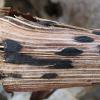
26-12-2013 19:59
These very small (up 70 125 microns), superficial,

26-12-2013 20:37
Eduard OsieckPiece of decorticated Fraxinus wood, collected 4 m

25-12-2013 22:52
 Rubén Martínez-Gil
Rubén Martínez-Gil
Hola a todos.Pongo fotos de una recolecta sobre ma

15-12-2013 11:50
Peter ThompsonHello Everyone,I have found some effuse fruit bodi

16-12-2013 19:34
 Joop van der Lee
Joop van der Lee
Found on horse dung. Most of the time I found th

24-12-2013 21:19
Hello friends, someone would have some work on Tri

24-12-2013 14:04
 Alex Akulov
Alex Akulov
Dear FriendsCan you help me with identification of
Sclerotia on grasses?
Byrain,
29-12-2013 04:30
Byrain,
29-12-2013 19:57
Re : Sclerotia on grasses?
In hindsight, I should of added that I scoped this, but found no spores, asci or anything else...

